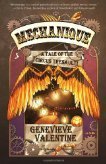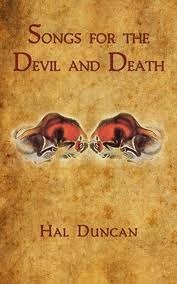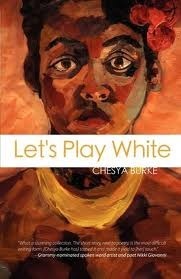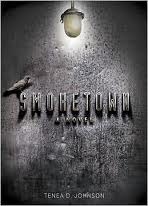Craig Laurance Gidney's Blog, page 69
November 2, 2011
New Story published – "Conjuring Shadows"
Please check out my experimental story of a transgender conjure woman in the Harlem Renaissance, titled "Conjuring Shadows." It's up at the November edition Expanded Horizons, along with work by Maria Velazquez (who interviewed me), Keyan Bowes (who once helped with a story), and A.J. Fitzwater.

 [image error]
[image error]



 [image error]
[image error]
September 14, 2011
Richard Labonte/PrideSource reviews FROM WHERE WE SIT
"From Where We Sit: Black Writers Write Black Youth," edited by Victoria A. Brownworth. Tiny Satchel Press, 336 pages, $16.95 paper.
Editor Brownworth slots this anthology into the Young Adult genre, and, sure, teen characters are the focus of the stories. But there's an elder sensibility in several that ought to entice older readers as well. That's certainly the case with Jewelle Gomez's "Caramelle 1864," a spin-off from her celebrated 1991 novel, "The Gilda Stories." Two young girls are at the story's heart, but the theme of African-Americans defying repression – one that suffuses the collection – touches all ages. Craig Laurance Gidney's "Bereft," in which a black scholarship student at a Catholic school defies white bullies, is more youth-focused, as is Becky Birtha's "Johnnieruth," in which a tomboy's sensed sexuality is stirred when she glimpses the shared affection of two women. Each of the 20 stories deals with what it means to be African-American, but the most searing is Lowell Boston's "Ten to One," in which a schoolboy, after defending himself from a white boy's attack, is singled out by his redneck principal as the troublemaker. Asked to write an apology to the school, he scrawls, "I am not a nigger."








August 25, 2011
Review of FROM WHERE WE SIT: Black Writers Write Black Youth
Lambda Literary Foundation reviews the anthology FROM WHERE WE SIT: Black Writers Write Black Youth (ed. Victoria A. Brownworth).
Two of my stories appear here.
One excerpt:
Craig Laurence Gidney's new diva worship classic, "Circus Boy Without A Safety Net," humorously delivers some much needed levity to gay coming-of-age topic that is inherently heavy.








August 24, 2011
Review of "Mechanique: A Tale of the Circus Tresaulti" by Genevieve Valentine
 Mechanique: A Tale of the Circus Tresaulti by Genevieve Valentine
Mechanique: A Tale of the Circus Tresaulti by Genevieve Valentine
My rating: 4 of 5 stars
Though it has steampunk flavoring, Mechanique is a hybrid novel, much like the half-human/half-mechanical characters (creatures?) it describes. It's a New Weird dark fantasy tale set in a dystopian war-torn landscape. The structure of the story and its narrative cogs are very postmodern. The text vacillates between first person narrative (in the voice of Little George, the Circus gofer) and third person points-of-view that range from brief character sketches to omniscient mis en scenes.
The novel tells the story of how the circus came to be. It was created by a former opera singer who discovers she has the power bind living flesh to skeletons made of copper. The process is magic, rather than scientific. She becomes just Boss, a ringmaster and owner of the Circus Tresaulti, which features mechanical aerialists, strongmen and a walking one-man orchestra. The circus travels over a bleak landscape of crumbling cities.
One story-line tells how each of the damaged folk managed to join, and describes the personal politics of the various members, who have all seen horrible things or come from bad backgrounds. Little George's story has a bildungsroman arc; other characters, such as the prickly aerialist Elena have their own arcs while other circus folk, like the cipher-like Bird, emerge as characters through indirect observation. The other story-line is about a 'Government Man'—who like Boss has no name save his job title—and his desire to learn Boss' powers for creating remade people for his own nefarious means.
Valentine employs a variety of techniques, from poetic quasi-fables, to brief anecdotes to full-fledged action sequences. Her world-building is suggestive rather than exhaustive—the Balkanized citystates the circus travels through have a vagueness that is more allegorical than precise. The story is ultimately about finding loyalty and beauty in dark times. Lovers of the work of the Brother Quay or Terry Gilliam, the painter Mark Ryder or the novel Geek Love by Katherine Dunn will find much to admire here.








August 14, 2011
Review of "Smoketown" by Tenea D. Johnson
 Smoketown by Tenea D. Johnson
Smoketown by Tenea D. Johnson
My rating: 4 of 5 stars
Smoketown, the debut novel of Tenea D. Johnson, belongs in a rare subset of speculative fiction novels that examine the relationship between art and society. These books include Pat Murphy's The City, Not Long After and a number of Samuel R. Delany's work, most notably Dhalgren. Smoketown, like the aforementioned works, blurs the boundaries between perception, magic and science, and the futuristic/transformed landscape is both a living metaphor and geography.
Anna Armour, an artist, is at the center of the nested narratives that comprise the novel that takes place in a distant, post-climate changed Southern city called Leiodare. A generation ago, the city was overrun with a mysterious epidemic called The Crumble, believed to have been spread by birds. As a result, a force field has been erected around the city that blocks birds from entering the city. Armour moves into the city, awaiting her on-and-off again lover Peru, who lives a nomadic existence as a 'virtuoso'–a living recorder of experiences for clients.
The cipher-like Peru is also the personal 'virtuoso' creator for Rory McClaren, the scion of the wealthy McClaren family, and its sole surviving member of the Crumble. Rory lives sequestered in his penthouse apartment, and has not left it for nearly 25 years, with no real human contact save through Peru's complex and beautiful 'virtus' (virtual reality creations). Rory's isolation is interrupted by the appearance of Dr. Eugenio Oliveria, a researcher and medical anthropologist at Leiodare's office of Emergency Management.
Eugenio is also a sometime practitioner of a religion/lifestyle called Mendejano; he is linked by this religion—which focuses on nature and reveres birds as sacred—to his soul sister Lucine, who is more devout. Eugenio is interested in talking to survivors of the Crumble and finds the McClaren family at the center of his research.
Anna is the catalyst for the action that effects the entire city—and she is connected (indirectly, sometimes) to the change that ripples through the character's lives. The introduction of magic in this mostly science fictional milieu makes perfect emotional sense.
The city of Leiodare is, itself, a character. It is a jungle city filled with many rich subcultures—including the titular Smoketown, a neighborhood of people of color who tend to numerous kilns. There is also an active gang culture—the main gang is called The Starlings.
Johnson weaves together all these strands together with lyrical prose and a thematic eye towards redemption and transformation.








August 9, 2011
Summer 2011
This summer has been a busy one. In June, I went to the Atlanta Queer Literary Festival, where I represented Lethe Press on a couple of panels. In July, I went to Readercon, outside of Boston, for the first time as a panelist, where I spoke about Geoff Ryman's fiction, and sat on a panel about postcolonialism in speculative fiction. And finally, last week, was the first annual Outwrite Book Festival in my hometown. Steve Berman came down with books and other goodies. I met many people, readers, authors and editors and got energized to write again.
Speaking of which, I have a couple of 'gigs' (i.e., invitations to submit), so I'd better start working on some of them!
All of these literary travels inspired me to grab a book or two as souvenirs….
(Let's Play White, Chesya Burke; Smoketown, by Tenea D. Johnson; Songs for the Devil and Death, by Hal Duncan)











July 18, 2011
New Review of SEA, SWALLOW ME!
Sea, Swallow me, by Craig Lawrence Gidney
# ISBN-10: 9781590210666, # ISBN-13: 978-1590210666
From Lethe Press, Sea, Swallow Me is a haunting, heart-breaking and lush collection of short stories. Gidney explores the trials of being African-American, of being gay, of being human. His language is beautiful, his themes are unique, and again, mythology threads beautifully through very modern stories. I don't think I've seen a more lovely blend of old and new.
From: http://wingsliftingwide.wordpress.com...








June 28, 2011
The Atlanta Queer Literary Festival
I had a great time at the Atlanta Queer Literary Festival this past weekend, where I was a panelist on three panels. I got to meet and talk with poet/publisher Bryan Borland of Sibling Rivalry Press, author Daniel Allen Cox and poet Brent Calderwood. Many thanks to festival organizers Collin Kelley and Megan A Volpert for making my stay a good one.








June 26, 2011
Readercon 2011 Schedule
1:00 PM Complicating Colonial Encounters. Craig Laurance Gidney, Anil Menon (leader), Robert V.S. Redick, Vandana Singh, JoSelle Vanderhooft. The colonialist narrative of taking over a wealthy new world to fund a decadent old world, while increasingly disparaged, is still prevalent and popular. Scholars Istvan Csicsery-Ronay and John Rieder have both written about science fiction's portrayal of empires; Nalo Hopkinson's anthology So Long Been Dreaming sought to expand the ways SF writers discuss colonial excursions; and there is substantial ongoing discussion of colonialism and anti-colonialism in steampunk. How can we as writers and readers complicate our understanding of narratives surrounding invasion, conflict, and territory before setting out to write another tale of humans conquering "the final frontier"?
Saturday July 16
1:00 PM Urban (Fantasy) Renewal. Leah Bobet (leader), John Clute, Ellen Datlow, Craig Laurance Gidney, Toni L.P. Kelner. The term "urban fantasy" has encompassed the work of Charles Williams, a contemporary of Tolkien who sometimes situated his fantasy in London or suburban settings as opposed to a pastoral secondary world; the novels and short stories of Charles de Lint, Emma Bull, or Robin Hobb (as Megan Lindholm); the phantasmagoric cities of China Miéville or Jeff VanderMeer; and most recently, the magical noir of Jim Butcher and Charlaine Harris. Is it possible to reclaim "urban fantasy" as useful critical term? Rather than wring our hands at how it no longer means what it did, can we use it to examine what these very different writers have in common, and to what degree they reflect different eras' anxieties around and interests in the urban?
8:00 PM I've Fallen (Behind) and I Can't Get (Caught) Up. Don D'Ammassa, Michael Dirda, Craig Laurance Gidney (leader), Jennifer Pelland, Rick Wilber. In a recent blog post for NPR, Linda Holmes wrote, "Statistically speaking, you will die having missed almost everything…. There are really only two responses if you want to feel like you're well-read, or well-versed in music, or whatever the case may be: culling and surrender." How do you choose among the millions of books that you could be reading? Do you organize your "to read" books or are all your books "to read" books? How useful are book reviews, Amazon recommendations, Goodreads, LibraryThing, etc.? How do you budget your limited reading time? And how do you cope with the knowledge that you will never read everything you want to?



















